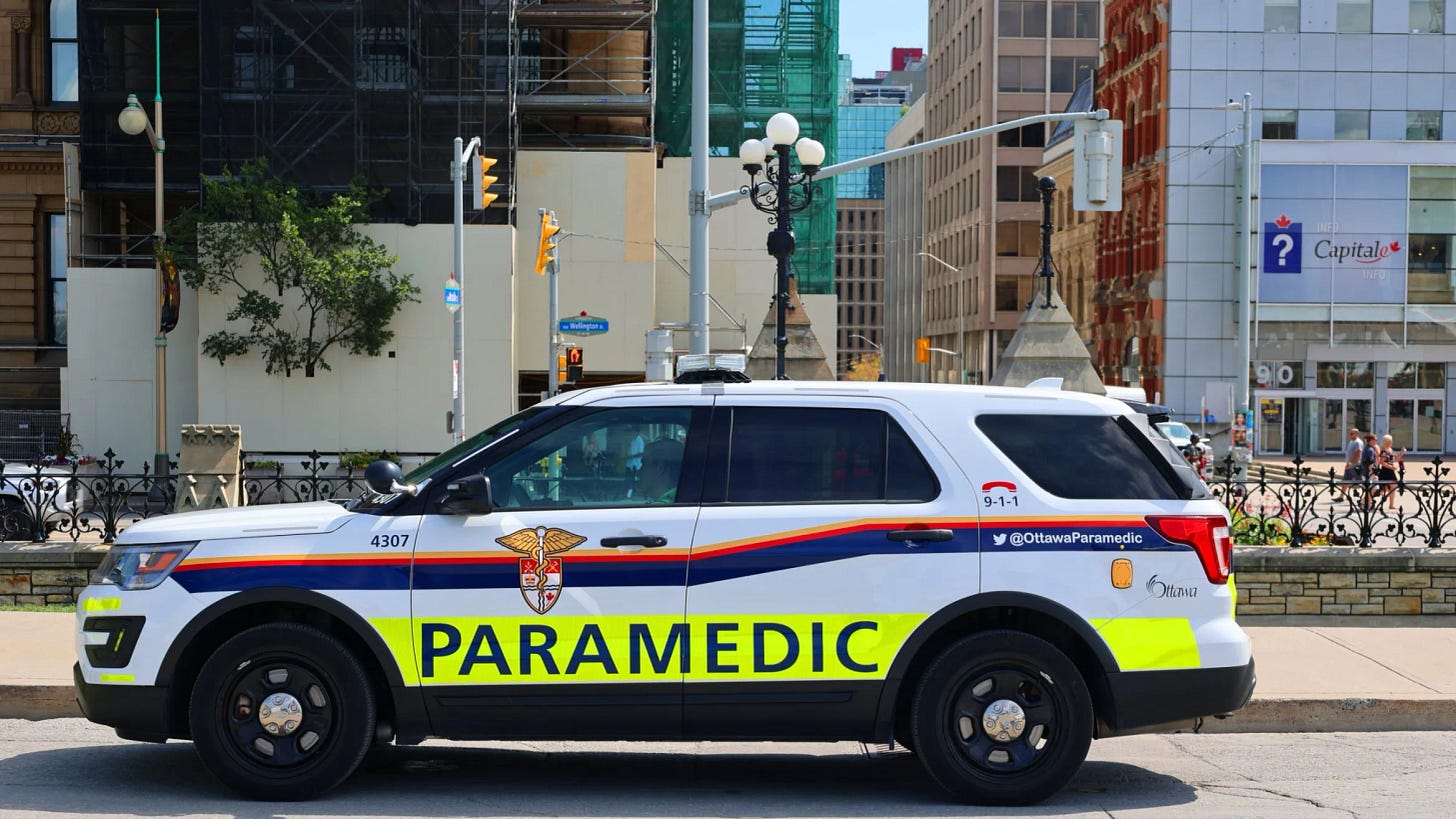Overdose surge in ByWard Market prompts new paramedic strategy
After Ottawa’s ByWard Market saw a 500 per cent increase in overdose calls, the city’s paramedic service responded with a new strategy
By Alexandra Keeler
Following a surge in 9-1-1 calls from Ottawa’s popular Byward Market area, Ottawa’s paramedic service recently launched a new strategy to deliver more targeted care to individuals struggling with addiction.
“We knew it was bad,” said Logan Martin, acting superintendent of the Ottawa Paramedic Service. “And then we took a look at the data and said, ‘Oh, this is really bad.’”
Since 2018, the ByWard Market area has seen a 500 per cent increase in overdose calls, according to Ottawa Police Service data. The number of overdose calls doubled between 2018 and 2022, from 77 to 144 calls a year. In 2023, that figure jumped to 467 calls in an area that is just steps from Parliament Hill.
Most of the 9-1-1 calls involved unconscious or cardiac arrest cases that were likely driven by drug overdoses, Martin says.
The new strategy, released July 2, expands the paramedic service’s role from providing traditional emergency response and hospital transport services to also offering extended care at the scene and follow-up referrals.
“This isn’t about trying to fix anyone,” said Martin.
“It’s really about being there for them and providing equitable health options for people, letting them know what resources are there, letting them know that when they’re ready, there are really kind individuals that are there and ready to help them.”
‘Moment of crisis’
The service’s new strategy includes staff training, resource sharing and referrals, and a dedicated advanced-care paramedic for the area.
Ottawa Inner City Health, a charity, has been helping train Ottawa paramedics through a program led by individuals who have experienced homelessness or substance use. Paramedics are taught to take trauma-informed approaches to interacting with unhoused populations, says Rob Boyd, the organization’s CEO.
“We know that the experience of the most marginalized people, in terms of the deprivations they’ve faced early in life, means they’re not starting at the same level as most Canadians,” said Boyd.
Ottawa paramedics have started administering Suboxone to help addicts manage opioid withdrawal symptoms. The aim is to stabilize users’ condition to improve their receptiveness to treatment options.
Addictions specialists follow up with users after 24 hours, to check in and create a personalized care plan, including referrals to other services.
“When people call in the moment of crisis and are looking for help, there’s a lot of discouragement when … there’s no one there to do that connection for them,” said Martin.
The paramedic service has also assigned an advanced-care paramedic to the ByWard Market. Staffed seven days a week, from 10 a.m. to 10 p.m., this paramedic independently chooses which emergencies to prioritize, says Martin. By contrast, most paramedics are required to follow established protocols when determining the sequence of their responses.
“What they’re doing is they’re getting to people quicker when it is truly a minutes-matter situation,” said Martin.
The Ottawa Paramedic Service is one of many service providers that participates in a Neighbourhood Operations Centre launched by the Ottawa Police Service in July 2023. The centre hosts weekly meetings with first-responders, bylaw officers, community workers and health officials to share insights and coordinate efforts to address community concerns.
Paramedics use an app to record their interactions with other service providers and catalogue new resources, such as medical clinics or mental health services. These data enable them to connect individuals with resources before a crisis escalates.
“We’re seeing this really positive momentum with the relationships that are building with the community and our paramedics, but then also with the other service providers,” Martin said.
Martin’s team will measure success by tracking the number of 9-1-1 responses and advanced-care procedures provided. The team also tracks proactive engagement, such as Naloxone kit distributions and educational sessions.
She says early feedback suggests the new strategy is already improving relationships between paramedics and substance users. But continued relationship-building efforts are needed.
“We’re really starting to see some of that trust and rapport is being developed with community members,” said Martin. “[Community members are] actually starting to recognize our paramedics and say, like, ‘Hey, I’ve got this really bad infection and I don’t have access to help.’”
This article was produced through the Breaking Needles Fellowship Program, which provided a grant to Canadian Affairs, a digital media outlet, to fund journalism exploring addiction and crime in Canada. Articles produced through the Fellowship are co-published by Break The Needle and Canadian Affairs.



I have an idea, promote the message don't do drugs rather than normalizing drug use. Smokers are stigmatized and marginalized trying to get them to quit, why not drug users?
They have a similar program in Pembroke, called MESA. Dedicated first response team. It definitely takes its toll on the first responders who are dealing with this specific trauma day in and day out. Here is the link: https://youtu.be/1BxC0zGdzJA?si=54ha2AXMVI0iiSH2. Acute overdose facilities will relieve some of the overflow from emergency resources, but "on demand" access to recovery programs would provide the pathway to a life beyond this endless cycle of addiction and homelessness.